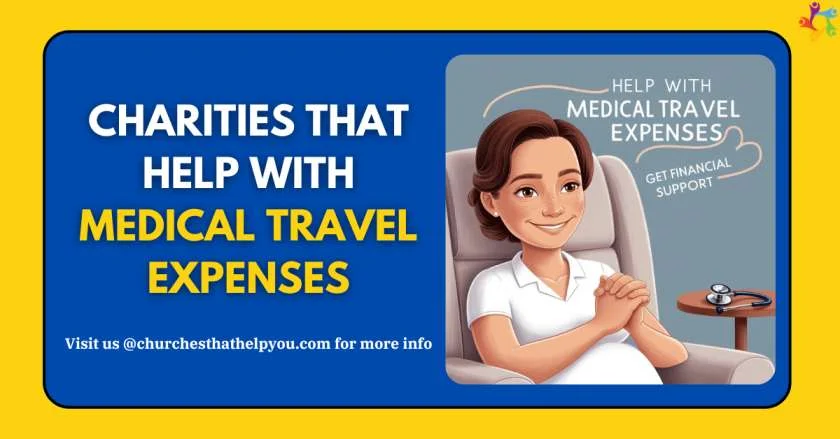Medical travel is not only a tiring process emotionally but also financially as well. Although medical treatments can be sought in other areas, it becomes difficult to get them because of transport costs, accommodation, and other incidental expenses. This is where charities come in, to assist in reducing the financial burden on the patients and their families.
In this article, the reader will learn about how different charitable organizations help with medical travel costs and the necessary information on how you can take advantage of it.
The cost of healthcare is still on the rise worldwide and patients are forced to travel long distances to get specialized care. The incidental expenses, including airfare, transportation, accommodation, and feeding, can be quite high. Such travel-related costs can effectively limit access to needed medical care. Thankfully, several charitable organizations have realized this need and provide financial and other assistance to help families.
Popular Charities That Help With Medical Travel
Here are some of the popular charities that help with medical travel. if you need help with medical travel then you can contact these charities.
Air Charity Network (ACN)
Provides free air transportation services within 1000 nautical miles. The patient must be mobile enough to board and disembark the aircraft. A financial need must exist and the patient must be medically stable enough to fly in a non-pressurized aircraft.
Air Charity Network comprises independent member organizations identified by a specific geographic service area, including Angel Flight and others. Call toll-free or visit the website to locate your area’s member organization.
National Patient Travel Center
The National Patient Travel Center connects families with air medical transportation for children who need to be seen by out-of-area specialists through several programs, including the National Patient Travel Hotline and the Patient/Companion Fee.
St. Jude Children’s Research Hospital
St. Jude Children’s Hospital helps care for children battling various diseases by providing free, life-changing medical services. They provide direct treatment for children with life-threatening diseases, including experimental or specialized treatments for children who have not responded to standard care. They also provide resources for families at all stages of treatment. In addition, they fund research to understand diseases and develop innovative treatments and cures. They also provide training for future doctors and biomedical researchers.
AMR Air Ambulance
A healthcare company providing bed-to-bed services worldwide for fixed-wing air ambulances, medical escorts, and commercial air ambulances since 2002. Offering the experience and benefit of a strong ground transportation base. Phone: (800) 424-7060 toll-free in the United States, 01.720.875.9182 internationally.
ChairFlights
Dedicated to providing air travel for people who use wheelchairs but are unable or unwilling to fly on airlines. Our rates will match the lowest airfares.
World Vision
World Vision works with communities, donors, partners, and governments to help offset the cost of providing health care to children living in poverty. They support children’s health by focusing on common problems in disadvantaged communities, such as malnutrition and preventable diseases. They also provide goods and services directly. For example, these organizations provide bed nets to protect children from malaria and train local health workers and families on prevention. In addition, their Healthy Timing and Spacing of Pregnancy initiative educates women and families about the benefits of delaying pregnancy for better health outcomes.
Corporate Angel Network
Arranges free air transportation for cancer patients traveling for treatment using empty seats on corporate aircraft. Visit their official website – https://www.corpangelnetwork.org/
Alex’s Lemonade Stand Foundation
The Alex’s Lemonade Stand Foundation helps pay for medical bills for children with cancer by funding research, raising awareness, and supporting and empowering families.
For example, they support families of children with cancer through their Travel for Care program, which reimburses travel costs for treatment, and their Super Ceps program, which provides comfort and encouragement to siblings. The ALSF grant program funds cutting-edge research on all aspects of childhood cancer, from early diagnosis to treatment. Additionally, the Children’s Cancer Data Lab initiative seeks to accelerate cancer research by simplifying access to existing data.
Mercy Ships
Mercy Ships is a global faith-based charity that operates hospital ships and medical clinics. With over 50% of the world’s population living near shore, Mercy Ships can provide more life-changing surgeries to more people on state-of-the-art hospital ships at no cost to the patient. Their mission is to bring hope and healing to the world’s poor, regardless of race, gender, or religion.
Global Health Outreach
As part of the Christian Medical and Dental Associations, Global Health Outreach is a short-term medical missions program. Global Health Outreach teams provide primary medicine and dentistry. Surgical teams work in partnership with small and large hospitals in the region.
Hospitality Homes
Provides short-term lodging in volunteer nursing homes for family and friends of patients receiving medical care in the Boston area.
Hosts for Humanity
Connects family and friends of patients traveling for medical care with volunteer hosts who offer lodging in their homes. Visit the official website – https://hostsforhumanity.org/
How Do Charitable Organizations Assist With Medical Travel?
Charitable organizations often provide vital support for people and families needing assistance with medical travel. Here’s how they typically help:
Travel and Accommodation Funding
Most charitable organizations provide funds for transport and accommodation for medical appointments. This is especially important for patients who need special care that is only available in other regions, for instance, chemotherapy or a transplant. Some of the organizations that offer free flights for medical travel include Miracle Flights and Angel Flight.
Relationships with Airlines and Hotels
Some charities have agreements with airlines where the latter provides free or heavily discounted flights. For example, Mercy Medical Angels and other organizations rely on commercial airlines and corporate sponsors to guarantee that patients can get treatment. Also, some organizations have arrangements with hotels to offer free or subsidized accommodation to families, thus reducing the costs.
Medical Travel Grants
Certain organizations provide grants for medical tourism. For example, the National Patient Travel Center provides grants to cover costs associated with travel for life-saving treatments. These grants often target low-income families, ensuring that financial limitations don’t become a barrier to care.
Travel Coordination and Case Management
Besides, monetary assistance, most charities also offer organizational support to families, assisting them with the organization of transport and accommodation. In some organizations, there are case managers who help in arranging for transport hence reducing the burden on the families in attending to the patient.
Gas Assistance for Medical Travel
The Free Gas Assistance Program is designed to help patients who need to travel for medical care but are struggling financially. These initiatives typically provide fuel vouchers or compensation to cover transportation costs. This helps reduce the burden of travel expenses, hospitals, and charities.
And many local organizations provide this support. This makes it easier for individuals to attend appointments and receive needed treatment. By reducing the financial stress associated with medical travel. These programs ensure that patients receive the care they need without the added stress of gas costs.
Free Transportation Grants for Individuals
Charities offer free transportation grants for individuals. But how do you get this free transportation grant? Here are the steps to get:
- Check Eligibility Requirements
Look for grants specifically for your situation (low income, disability, senior, student, job seeker, etc.). Some grants require proof of income, medical needs, or employment status.
- Search Local Resources
Contact your city or state transportation department for available programs. Visit 211.org to find nonprofits offering transportation help.
- Apply Early
Many Transportation grants have limited funding and offer assistance on a first-come, first-served basis. You need to submit applications as soon as possible to increase your chances.
- Use Multiple Sources
Apply for multiple grants to increase your chances of approval. Consider combining local, state, and nonprofit programs for better support.
How to Apply for Charity-Based Medical Travel Assistance?
Applying for medical travel assistance through charities can be a relatively straightforward process, but it’s important to be prepared. The application process includes filling out forms, providing documentation of medical necessity, and demonstrating financial need.
- Identify the right charity: It is important to check what kind of help charities offer. Some are disease-oriented while others are restricted to certain regions of the world. You should then look for the charity organization that will suit you best.
- Prepare necessary documents: Any organization will need to see proof of income, a letter from your doctor, and evidence that you need to travel for treatment. Some may also request a medical history or a travel itinerary.
- Apply: Some charities have online application forms while others may need an applicant to call or fill a hard copy form. Please ensure that all sections are filled and all necessary documents are enclosed.
- Follow up: Once you’ve submitted your application, then contact the organization to confirm they’ve received it and ask if they need any additional information.
Eligibility Criteria for Medical Travel Charities
Income: Many organizations require applicants to fall below a certain income threshold to qualify for assistance.
Location: Some charities only assist patients from specific geographic regions or countries.
Medical necessity: You will generally have to prove that the medical treatment you are seeking is not available in your area and that you have to travel for it.
Insurance status: Sometimes, having health insurance may be a disqualifying factor because the charity may want your insurer to contribute to the costs. However, this is not consistent across organizations.
Tips for improving eligibility chances:
- Apply it early because most organizations have limited budgets and may exhaust them as the year progresses.
- Ensure all your paperwork is complete and accurate to avoid delays.
- Be transparent about your situation, including your financial need and medical condition.
Conclusion
In summary, charities that help with medical travel expenses are important in ensuring that financially challenged individuals have access to needed medical care. These organizations provide invaluable support by covering travel, lodging, and sometimes food. Help patients and families focus on their health instead.
More than a financial burden Whether it is life-saving treatment Such assistance has a significant impact on the lives of those in need, providing hope, comfort, and peace of mind during challenging times. Access to these charities can be a roadmap for many facing the challenges of their medical journey.
FAQs
How can I find charities that assist with medical travel expenses?
You can search online for organizations that specialize in medical travel assistance. Inquire from hospitals in the area. Or you can contact the community health center for advice.
Is there a limit on the assistance I can receive?
Yes, many charities limit the amount of assistance they can provide. This may vary depending on your organization’s funding and specific needs. It is best to inquire directly with the charity about their specific policies.
How long does it take to receive assistance after applying?
The time frame for receiving assistance can vary by organization. Some charities may process applications quickly, while others might take several weeks or longer, depending on their resources.
How Much Can You Claim for Medical Travel Expenses?
The amount you can claim for medical travel expenses varies by location and tax regulations. In the U.S., the IRS allows you to deduct 20 cents per mile driven for medical purposes, along with costs for public transportation, parking, and tolls. Always check current regulations for specific limits.
- Financial Help for Homeschooling – How to Get Help? - April 1, 2025
- Help with Emergency Vet Bills – Exclusive Tips to Get - March 28, 2025
- Charities That Offer Emergency Help Paying Car Insurance - March 25, 2025



